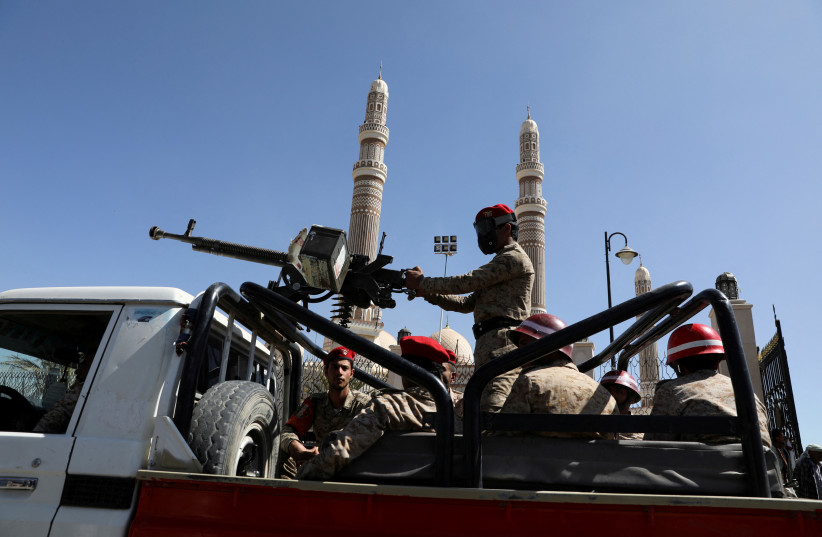The international community is pressuring the parties in Yemen for a six-month extension of the UN-sponsored truce that began in April and is due to expire on August 2.
For more stories from The Media Line go to themedialine.org
The cease-fire has seen the longest period of peace in the country in the last six years. Hans Grundberg, the United Nations special envoy for Yemen, is leading efforts to address both parties’ demands to get them to agree to renew the truce. In the coming days, he will travel to Oman to meet the head negotiator of the Iran-backed Houthi de facto authority, and to the city of Aden in Yemen, the headquarters of the Saudi-backed internationally recognized
government.
Support for extension
The Quint group of countries − the US, UK, Saudi Arabia, United Arab Emirates, and Oman – held a virtual meeting on Monday. They expressed support for the extension of the truce and called on the Houthis to be flexible in the negotiations.

Aymeric Faure, World Food Program partnerships officer who has been in Yemen since September, told The Media Line the situation has somewhat improved since the truce began in April this year.
One of the major improvements is in the availability of fuel, the Frenchman explained. “Before the truce, people were queuing for hours and days to get fuel,” he said.
Additionally, he noted that the country is experiencing a significant decrease in violence because of the cease-fire.
“Before the truce, people were queuing for hours and days to get fuel."
Aymeric Faure
Faure also cited the reopening of the Sanaa airport for international flights. Two days ago, he recalled, “I was playing volleyball outside with a group of Yemeni friends when the noise of a plane flying was heard. They all stopped playing and were trying to see the plane in the sky with candid enthusiasm. Their excitement reveals how important this is after years of being locked in.”
Inbal Nissim-Louvton, an expert on Yemen, a lecturer at the Open University of Israel and a research associate at the Forum for Regional Thinking, discussed a few more benefits of the truce.
Nissim-Louvton cited the exchange of prisoners between the Saudi-led Arab Coalition forces and the Houthis, and the partial opening of the aerial and maritime spaces, which has facilitated the entrance of imports to the country.
She believes that if the international community manages to achieve the extension of the truce, the developments mentioned above will deepen and expand to several Yemeni districts where the civil war is still active.
Faure noted, however, that the situation in Yemen is still dire, and it has been exacerbated by global crises such as the COVID-19 pandemic and especially the Russo-Ukrainian War. After eight years of war, the civilian population has paid the highest price, exhausting their coping mechanisms and resorting to community-based solidarity chains to meet their basic needs, he explained.
He added, “Yemen faces tremendous challenges induced by the crisis in Ukraine. Food and fuel prices, and food scarcity, are strongly affecting the private sector’s ability to import the required quantities.” The humanitarian sector faces the same challenges and a shortage in funding that limits its capacity to help all the people who need it, Faure said.
Nissim-Louvton added that there is also a management problem to be considered. “It is also about the poor logistics to distribute it and make sure it gets to the right hands and that it is not being used as a weapon or a means to buy loyalty,” she noted. Faure stressed that the lives of a large portion of the population are at risk. The most urgent need is to provide the most vulnerable populations with humanitarian assistance to keep them alive, he said.
While political processes are ongoing under the leadership of the UN envoy and with the participation of many international actors, he continued, “Hungry children and families cannot wait without food, treatment for malnutrition, health services, water, etc.” He pointed out that the World Food Program is delivering food assistance to more than 10 million people and providing nutrition treatment to 1.3 million people in Yemen. However, that is far below the number of people in need, Faure said.
Nissim-Louvton said that for the country to be rehabilitated, its political structure needs to be decided by the parties. The war is largely about how the new Yemen will look, she said. It’s about “whether it will be organized as in the ’60s, when it was divided into North and South; or if it is going to be a federal state with six districts that are subject to the center in Sanaa; or if a new model will be used,” she said.
That needs to be decided before we can talk about the rehabilitation of the country and all its institutions, infrastructures, health and education centers, and the need to treat an entire generation of children that was born into the war, Nissim-Louvton said.
